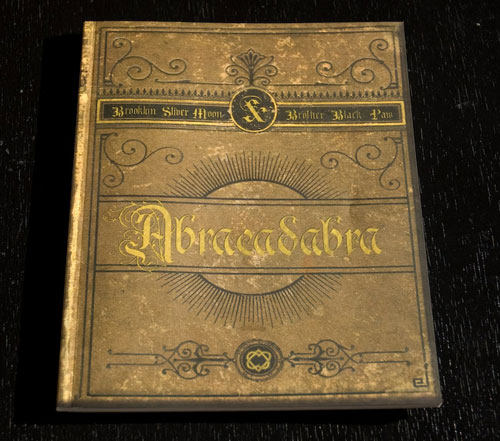Ollie Mealing: Creative progress requires pursuit of these two elements
Ollie Mealing, creator of Control and Recoil, is a consultant for Derren Brown and created some of magic’s most-buzzed about videos on the Internet. On a break, he got a chance to check in about the key process behind making creative progress, and learning how to unlock the creative spark that leads to original ideas.
Everybody has goals they wish to progress towards, but hope and luck are no basis for a strategy — achievement requires knowledge.
At the heart of progress is information. When we acquire information we strengthen our knowledge and therefore gain progress towards discovering how we can achieve our goal — developing a strategy that allows us to regularly increase and practice our knowledge is the key to continual progress.
So if we regularly need information to progress, then we need to know how to reliably obtain it.
For that, in my mind, we’re reliant upon a combination of inspiration and motivation, or in other words, ideas worthy of acting upon. The potency of inspiration affects the consequent feeling of motivation, when the desire to fulfil an idea feels significant, motivation takes over and spurs us on with an abundance of energy.
As beneficial as this is, it blinds from considering every idea as being worthy of acting upon, which we must do if we’re to discover their true worth. Providing we act on our ideas they will always provide us with new information. It’s this recurring insight that allows us to build up our knowledge and create new, wiser ideas, which promotes the cycle’s continuance and strength.
Progress requires information which results from acting on ideas — you need to pursue something in order to learn from it.
So how can we enable ideas to emerge?
Extracting encounters
We assume most resources for ideas are the ones that we see advertised to us (books, DVDs, lectures). We take these readily available resources for granted and lose sight of the fact that behind each one of them is a person just like you and me.
Ideas are extracted from things we’ve encountered — for clarity I’ll continue to call these things “encounters.” They are the first step towards an idea. Encounters can exist in AND outside of magic. They can include watching a performance, sitting on a train, making a cup of tea. They can be absolutely ANYTHING — it’s the length at which you interact cognitively with these encounters that determines the likelihood of extracting ideas.
This second step is extraction. Extracting ideas relies on your capacity to interpret the creative thought you employ when trying to perceive beyond face value — through encounters and extraction, every idea there’s ever been or will be, comes to light.
To help visualize these steps, I remind myself of the following quote from Henry David Thoreau: “It’s not what you look at that matters, it’s what you see.” Which in this case translates to:
• Encounter: What you look at.
• Extraction: What you see.
But keep in mind, an encounter isn’t just limited to what you can look at.
Playing out a curious internal dialogue fuels your ability to extract from an encounter. For example, if I look at a painting: what, why and how do I see what I do, how and why does it make me feel, how else can I interpret this painting, who and why felt compelled to create this, why has it been created this way, what’s being communicated and is it of interest, what have I learnt about myself from looking at this painting.
Asking and answering these sort of questions, all while keeping magic in mind, you begin to enrich your sensibility and encourage the chance of extracting an idea.
Imagine each encounter as a key to a room. The more keys you have, the more rooms you can open. Now imagine extraction as footsteps — the more footsteps you can take the further you can explore each room. Running with what you have allows your potential to emerge; taking that potential, refining, personalising and expanding it is what leads to originality.
Extraction methods
Keeping a record of your encounters is essential. You may find that some types are more conducive towards extraction than others. With this awareness you can factor time into your day where you re-energize your motivation by revisiting (if you can) useful encounters. Equally as important, you should also aim to note the exact thought which sparked extraction — by listing them you provide yourself with a higher chance of being able to extract more ideas from past and future encounters.
The ideas you produce will vary depending on the encounter as well as your train of thought, but you’ll find that those ideas can (and should be) categorised. For example, some encounters may favor ideas that are specifically advantageous towards performance, creativity, plots, patter, method or theory… the list goes on, so by logging those findings you create a list of relevant sources should you wish to spend some time concentrating on a certain aspect.
All your ideas, whether their outcome is positive or negative, and all procedure in how you extract and acted on them should be noted and organised. This serves to form a picture of your potential which in itself aids progress and in time helps you to recognise and establish your style — the distinguished features which are fitting for you is something I intend to discuss in a future blog post.
Becoming a habit
As our progress gradually increases then further progression tends to become almost self-sustaining as our lifestyles become naturally more oriented around our most beneficial encounters. Our ability to extract ideas requires less conscious effort — both these processes transcend to being habit.
Conveniently the act of discovering new information encourages further productivity but regardless of how effortlessly productive we may become, we should never discard the importance of seeking out new encounters and new extraction techniques — complacency marks the demise of progress.
Progress is the result of gathering cards. Achievement occurs when you can deal yourself the winning hand.
From http://blog.ellusionist.com/ollie-mealing-creative-progress-requires-pursuit-of-these-two-elements/



